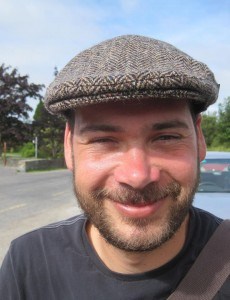
“Roundtable Regular” Kevin Whitesides is a PhD student in Religious Studies at the University of California Santa Barbara working within the cognitive science emphasis in the department. His PhD research will focus on the development of contemporary 'new age' networks. Kevin earned his B.A. in Religious Studies at Humboldt State University with minors in anthropology, philosophy, and psychology. He completed an MSc dissertation at the University of Edinburgh on ’2012′ millennialism as part of a broader emphasis on processes of countercultural transmission. Kevin has contributed articles to ‘Archaeoastronomy’ and ‘Zeitschrift fur Anomalistik’, and 'Nova Religio', and has contributed chapters for two anthologies on apocalypse and prophecy, and has presented widely on the ’2012′ millenarian milieu at academic conferences and universities.
Fourteen contestants. One tetchy quizmaster. Three microphones. Numerous cases of wine. One glamorous assistant. Many bruised egos. A boisterous studio audience. A splash of irreverence. Dozens of questions. Four years of podcasts! A rapidly diminishing reservoir of academic credibility. And far, far too many in-jokes...
This response is a defense of the academic interest in the individual, which I take to be inclusive of the variety of ways that the activities of individuals are constrained, or not, in any given context. All constraints are not equal. Veronique Altglas is to be commended for her intervention into the contemporary academic discussions and (often uncritical) usage of the concept of bricolage. As she rightly suggests, ...
A while back a few of us gathered for what became the first of a 'successful' bout of roundtables conducted by a cadre of 'amazing people' with differing and 'unique' opinions. In that first ‘test’ for the ones that would follow, six of us gathered together to discuss the ‘future of religious studies.’
"The assertion that an experience which takes place while under the influence of a drug should not be construed as having religious import implicitly makes a value-judgment about what true or valid religion can consist of, whereas an examination of how hermeneutic and discursive resources are drawn upon to develop a personal or communal account in which drugs and the experiences they elicit are ‘deemed religious’ (Taves 2009) is likely to provide significantly more analytical purchase."
As online communications technologies become more pervasive and sophisticated, this provides new opportunities and challenges for the creation of alternative learning environments which may differ in significant ways from traditional face-to-face environments. In this interview, Doe Daughtrey talks to Kevin Whitesides about the issues surrounding this increasingly important aspect of academia.
"...it could be more conceptually misleading to talk about ‘religious violence’ than it would be to talk about ‘violence involving religion’. Whereas the former can appear to refer to a distinct category, the latter phrasing implicitly reminds us that human violence is the broader category and that sometimes religious considerations can be involved in that, among others."
During her recent trip to the UK, the Religious Studies Project managed (with the promise of copious Pink Gin) to persuade Professor Carole Cusack to take part in a roundtable discussion. She suggested that we discuss how to build an academic career – advice which she has been generous with to many people in the past. That having been agreed, ...
Ninian Smart was a proponent of the idea that Religious Studies should be "poly-methodical"; but should Religious Studies as a discipline incorporate theories and methodologies from multiple other disciplines, such as sociology, anthropology or history? When RS departments have run on an interdisciplinary basis, have they been successful?
In another roundtable gathering, conversation ranges from the strengths and weaknesses of such data, whether there is more to the social sciences than quantitative methods, and the place of the social sciences within a multi-disciplinary Religious Studies field. Can we trust social sciences when we study religion? Is a social scientific approach the future of religious studies?
After this week’s podcast, which involved eight scholars giving their views on the future of Religious Studies, there was really only one way we could create a suitably collective and varied response – six postgrads sitting around a table, accompanied by pink gin and our trusty dictaphone. Conversation ranges from the public perception of what Religious Studies does, ...
This work is licensed under a Creative Commons Attribution- NonCommercial- NoDerivs 3.0 Unported License.
The views expressed in podcasts, features and responses are the views of the individual contributors, and do not necessarily reflect the views of The Religious Studies Project or our sponsors. The Religious Studies Project is produced by the Religious Studies Project Association (SCIO), a Scottish Charitable Incorporated Organisation (charity number SC047750).